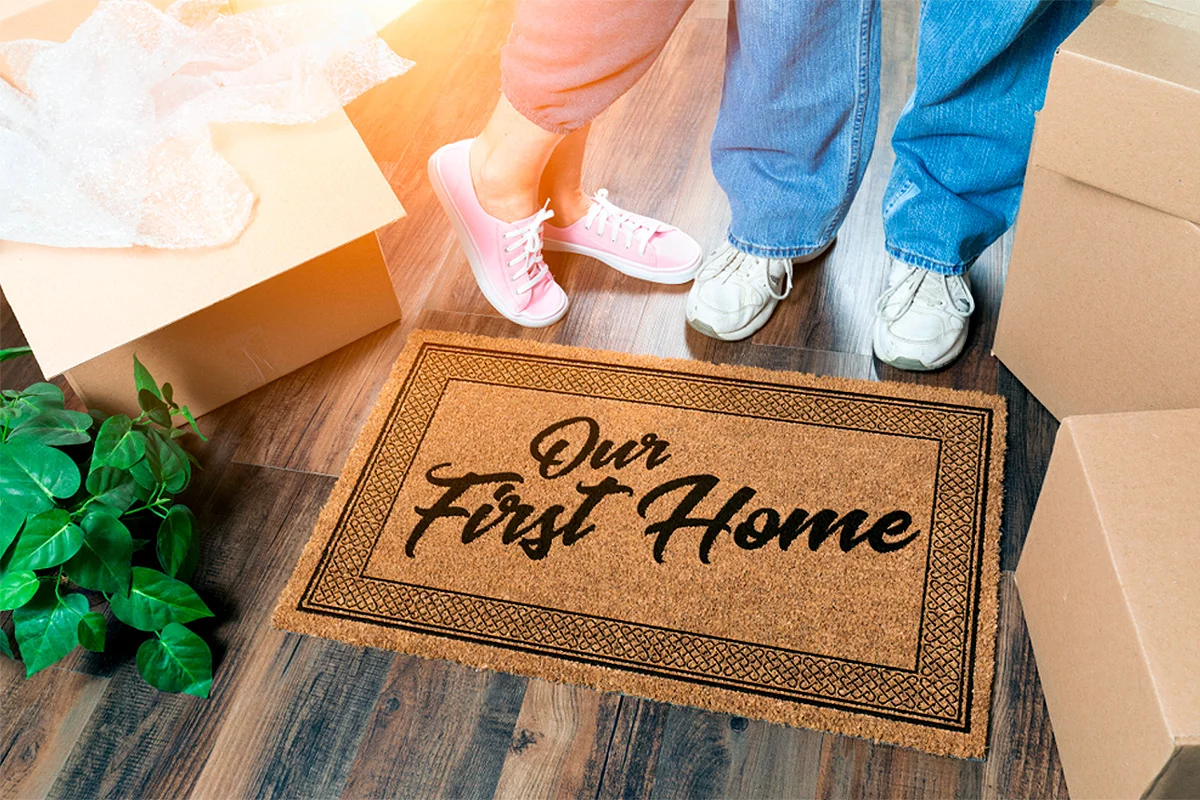When determining your financial readiness to purchase a house, it is crucial to consider both the initial costs associated with homebuying and the ongoing expenses that need to be factored into your post-closing budget.
While saving for initial costs such as the down payment is important, it’s equally important to prepare your bank account for monthly bills and unforeseen expenses that come with homeownership. As a homeowner, you bear the responsibility of managing these financial obligations.
If the thought of owning a home has crossed your mind, let’s delve into the expenses associated with purchasing a house.
Expenses Incurred When Buying a House
Down payment
Average estimated cost for first-time buyers is typically around 6%-7% of the purchase price.
When it comes to purchasing a home, the down payment is often a significant concern. However, here’s some good news: while a 20% down payment allows you to avoid mortgage insurance (more details on that later), it’s not a requirement. You have flexibility when it comes to the amount you put down.
With certain types of home loans, your down payment could be as low as zero.
- Conventional loans offer the flexibility of down payments as low as 3%, providing borrowers with greater affordability and accessibility in homeownership.
- Federal Housing Administration (FHA) loans offer the advantage of down payments as low as 3.5%, providing accessible options for aspiring homeowners.
- VA loans, backed by the U.S. Department of Veterans Affairs, offer service members and veterans the opportunity to secure home loans without requiring any down payment. This invaluable benefit empowers those who have served our country to achieve homeownership with ease.
- USDA loans, granted by the U.S. Department of Agriculture, offer buyers in rural areas the opportunity to make a down payment as low as 0%.
Down payments often require finding a middle ground, striking a balance between what you can realistically save and your eagerness to become a homeowner sooner rather than later.
Closing costs
The estimated cost typically ranges from 2% to 6% of the loan amount.
Closing costs refer to the fees paid by both the lender and third parties at the conclusion of a real estate transaction. In simpler terms, they are the expenses incurred on the day you finalize all the paperwork and receive the keys to your new home. While the buyer is primarily responsible for most closing costs, the seller typically covers a few, including the real estate agent’s commission and, in some cases, a real estate transfer tax.
Typically, closing costs amount to 2% to 6% of the loan value. For instance, if you have a $350,000 home loan, you can anticipate closing costs ranging from $7,000 to $21,000.
Closing costs can include:
- Lender fees (origination, application, credit check and so on)
- Prorated property taxes, homeowners insurance and homeowners association fees
- Home inspection (optional, but highly recommended) or a lender-required pest inspection
- Appraisal
- Real estate attorney fees
- Title search and insurance fees
- Discount points
Government-backed loans and their associated closing costs: If you have an FHA loan, your closing costs will include an upfront mortgage insurance payment equal to 1.75% of the total loan cost. VA and USDA loans, on the other hand, do not require mortgage insurance. However, they do have funding fees that are paid at closing. The VA funding fee varies from 1.4% to 3.6%, depending on your down payment size and whether you’ve used a VA loan to purchase a home in the past. Similarly, USDA loan guarantee fees also vary, but they are capped at 3.5%.
Upon obtaining preapproval for a home loan, you will be furnished with an official Loan Estimate, meticulously delineating all the associated closing costs. This comprehensive document will elucidate the expenses that can be subject to negotiation and those that are non-negotiable, providing you with clarity and enabling you to make informed decisions.
Moving
Estimated cost: For the majority of local moves, the price usually falls below $2,500. However, for longer distances or heavier loads, the cost can be higher.
Moving, whether it’s across the country or just across town, comes with its own expenses. While professional movers may charge more than a DIY move, the convenience they provide could outweigh the cost. Consider the value of your time and effort when deciding which option suits you best.
According to HomeAdvisor, the cost of local moving, which includes two professionals and a truck rental, usually falls within the range of $900 to $2,500. If you’re moving a greater distance, such as out of state, the costs will increase. In fact, long-distance moves can easily exceed $6,000.
The cost of your move will increase based on the amount of items you need to transport and any additional services you require, such as packing, unpacking, furniture assembly, or handling oversized items like pianos or swing sets. Moving expenses tend to be higher during peak periods of demand, such as summer weekends.
If you choose to handle it on your own, you can save on costs (although your back might not thank you!). However, you will still need to allocate a budget for packing supplies like boxes and tape.
Ongoing homeowner expenses
Making Mortgage Payments
As a homeowner, your mortgage payment is likely to be your largest recurring expense. It encompasses both the principal, which is the amount you borrowed to purchase the home, and the interest.
Generally, your mortgage payment remains consistent over time, unless you have an adjustable-rate mortgage or decide to make changes, such as refinancing. However, the allocation of your payment between principal and interest will shift throughout the loan term. This process is known as amortization.
Finding ways to save on monthly mortgage payments can be a smart financial move. While buying a less expensive home may seem like an obvious solution, it’s not always feasible in today’s housing market. However, regardless of your home’s price, there are strategies you can employ to lower your mortgage payments.
One effective approach is to compare multiple mortgage lenders and secure the best interest rate available. Even slight differences in interest rates, which may appear inconsequential, can actually result in significant savings over time. By doing your due diligence and exploring your options, you could potentially save hundreds of dollars each year. And when you consider the long-term implications, these savings can really make a difference in the overall cost of your loan.
Remember, optimizing your monthly mortgage payments requires careful consideration and proactive decision-making. By taking the time to evaluate different lenders and interest rates, you can make informed choices that will help you manage your mortgage payments more effectively.
Property taxes
Property taxes are typically payable annually or semi-annually, but it’s important to note that tax laws and policies differ from one state and county to another. You can easily access local tax information online, which will assist you in assessing whether a particular town or neighborhood falls within your budgetary constraints.
Municipal projects and expenses may prompt local governments to raise property taxes, so it is unwise to assume that yours will remain unchanged. Moreover, any increase in the assessed value of your home, be it a result of renovations or overall market conditions, can also lead to a rise in property taxes.
A significant number of homeowners choose to have their mortgage servicers handle property tax payments by maintaining funds in an escrow account. This arrangement ensures that if there is an increase in property taxes, the monthly mortgage payment will be adjusted accordingly to accommodate the additional tax liability.
Homeowners and hazard insurance are crucial components of protecting your property
Similar to taxes, these two insurance types differ from state to state and region to region. Additionally, your lender may pay for them from an escrow account. The cost of hazard insurance, typically included in homeowners insurance, is determined by various risk factors in your area, such as floods and earthquakes.
By bundling your homeowners insurance with your auto or life insurance policies, you can often save on costs while ensuring comprehensive coverage for all your needs.
Mortgage insurance
When you make a down payment of less than 20% on a conventional loan, you’ll be required to pay private mortgage insurance, commonly referred to as PMI. The cost of PMI typically ranges from 0.58% to 1.86% of the original loan amount annually, as stated by the Urban Institute’s Housing Finance Policy Center.
Mortgage insurance premiums provide protection to the lender in case of loan default. These payments are typically included in your monthly mortgage payment. Once you have achieved a minimum of 20% home equity, you have the option to cancel the mortgage insurance.
With an FHA loan, the rules regarding mortgage insurance differ slightly. Alongside the one-time fee of 1.75% at closing, you’ll also be responsible for monthly mortgage insurance payments ranging from 0.45% to 1.05% of the total loan amount. If your down payment is less than 10%, FHA mortgage insurance remains in effect for the duration of the loan. The only way to eliminate it is to refinance to a conventional loan or sell the home. Conversely, if you make a down payment of 10% or more on an FHA loan, you’ll only have to pay FHA mortgage insurance for 11 years.
VA and USDA loans do not necessitate mortgage insurance, however, a one-time funding fee will be applicable, as mentioned earlier.
Homeowners association (HOA), cooperative (co-op), or condominium fees
When purchasing a house in a planned development with a homeowners association, or when buying a condo or co-op, it is likely that you will have an additional monthly HOA fee in addition to your mortgage payment. This fee covers the cost of shared amenities, such as landscaping or pools, as well as the maintenance and repairs of the building or shared community spaces.
In expensive urban regions, homeowners association (HOA) fees can sometimes match or even exceed mortgage payments. It’s crucial to carefully consider these costs before making a purchase. Additionally, it’s important to assess if the housing complex is in need of significant upgrades, as this could result in a special assessment. This assessment would entail an additional bill that covers each homeowner’s portion of the collective improvement project.
Utilities and maintenance services
Some monthly bills, like Wi-Fi, won’t be any different from renting. However, others might take a bigger bite out of your budget. (Unsurprisingly, heating and cooling an entire house can cost considerably more than keeping a one-bedroom apartment comfortable.)
As a homeowner, your essential utility bills might include:
- Electric
- Gas
- Water and sewer
- Trash and recycling
- Home internet/Wi-Fi
According to the U.S. Bureau of Labor Statistics, the Federal Reserve Bank of St. Louis highlights that urban consumers spent an average of $311.69 per month on electricity, heating, and cooling in September 2022. Additionally, the Environmental Protection Agency states that the average monthly water bill amounts to approximately $83.Trash and recycling costs vary by area: Sometimes you pay privately, other times your city or municipality handles one or both services. Generally, trash pickup bills range from $15 to as high as $100 per month.
According to the 2022 Broadband Pricing Index, the average monthly cost for home internet ranges from $36 to $58, depending on the chosen speed.
Consider hiring someone to handle routine maintenance tasks that your landlord used to take care of. These may include snow removal, yard care, or HVAC tuneups. By delegating these responsibilities, you can free up your time and ensure that these tasks are handled efficiently.
Emergency Fund for Your Home
Consider establishing an emergency fund designated for home-related expenses, such as unforeseen fridge breakdowns or plumbing mishaps. By setting aside funds for unexpected household costs, you can avoid depleting your last-resort emergency savings or resorting to credit card debt. This prudent approach will help ensure financial stability and peace of mind.
To ensure long-term maintenance and repairs for your home, it is advisable to set aside a minimum of 1% of its market value annually as a dedicated fund. This prudent approach will help safeguard the condition and value of your property over time.
Contact Sword Mortgage To Learn More About Your Options
Call (770) 757-5750 or complete our online form to speak with a loan expert at Sword Mortgage to get help navigating your options and find a loan that fits your needs today.




